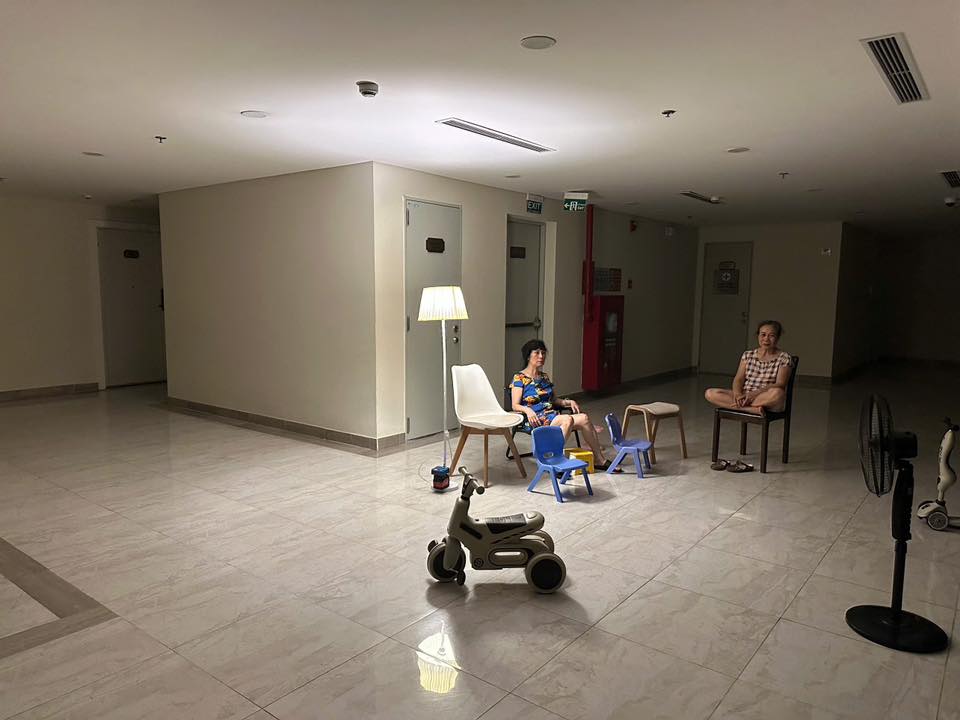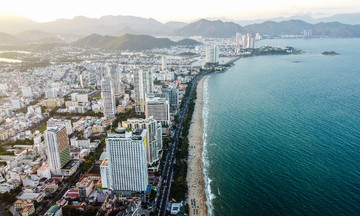Dinner on 4/8 was interrupted for Phuong Anh’s family in Tay Ho when all three buildings in their complex, housing nearly 1,000 families, were suddenly plunged into darkness. Building management announced a transformer failure, estimating a lengthy repair time.
Chaos immediately followed.
People brought portable fans into the hallways and spread mats in the common areas. Down in the parking garage, families started their cars, turning on the air conditioning for refuge. Others packed their belongings and called taxis to find hotels, as the electric garage door wouldn't open.
Phuong Anh lives on the 25th floor. Initially, the elevators and hallway lights functioned on backup power, but soon everything was shut down to allow technicians to address the problem. "We felt trapped. Staying inside was unbearable in the heat," she said.
With no other options, the couple carried their young child and essential supplies, using their phone flashlights to navigate the 25 flights of stairs. "On the way down, we encountered many elderly people and small children also making their way down in the darkness," she recounted.
 |
Residents of an apartment building in Tay Ho, Hanoi, bring lamps and portable fans to the common area to cool off after a power outage on the evening of 4/8. Photo: R.S.T.H |
Residents of an apartment building in Tay Ho, Hanoi, bring lamps and portable fans to the common area to cool off after a power outage on the evening of 4/8. Photo: R.S.T.H
Exhausted from the heat, Phuong Anh was struck by her neighbors' optimism. The usually quiet apartment group chat buzzed with activity. Instead of complaining, residents shared ideas for coping: from tips on starting electric cars in the garage to use their air conditioning, to gathering on the rooftop garden for a breeze and games, to sharing photos of the technicians at work, reassuring everyone.
After almost three hours, power was restored. Phuong Anh’s family and other displaced residents returned home.
In the early hours of 5/8, the power went out in Bui Phuong’s high-rise apartment building in Nam Tu Liem. Although a major incident, the hallways and elevators remained operational thanks to backup generators, resulting in a large-scale, middle-of-the-night "evacuation." She compared the scene to people rushing to a concert.
Many families, unable to bear the heat, booked hotel rooms. Phuong’s family tried to manage with a single portable fan, but doubted they could last until morning. Just as they were about to seek refuge elsewhere, power returned around 4 a.m. However, the supply was weak, and the air conditioner was ineffective. "Everyone woke up with sweat-soaked backs," she said.
Their troubles didn't end there. Later on 5/8, the building experienced another outage. This time, Phuong had to send her two children to a relative's house before going to work.
"Living in a high-rise apartment with unreliable electricity, if the power goes out again tonight, my family might have to go on a 'staycation' to escape the heat," she said.
A sudden power outage at an apartment building in Tay Ho, Hanoi, caused the garage door to malfunction, forcing security personnel to manually assist vehicles in exiting on the evening of 4/8. Source: R.S.T.H
A VnExpress survey on 4/8 and the early hours of 5/8 revealed that many apartment buildings and residential areas in Bac Tu Liem, Nam Tu Liem, Tay Ho, Thanh Xuan, Cau Giay, Ha Dong, and other districts experienced sudden power outages, lasting from a few tens of minutes to several hours, significantly disrupting residents' lives. Some residents chose to stay home, while many sought refuge in hotels and motels to escape the heat.
According to the National System and Market Operation Company (NSMO), northern Vietnam is experiencing a severe heatwave. On 4/8, Hanoi's temperature neared 40°C, with a heat index reaching 47°C.
The extreme weather led to a surge in electricity consumption. Hanoi Power Corporation (EVNHANOI) reported a new peak power demand in the capital at 1:20 p.m. on 4/8: 5,988 MW, an almost 14% increase compared to the 2024 peak. Electricity consumption in just the first four days of August increased by over 25.5 million kWh.
The high consumption overloaded several power lines and transformer stations. An incident on the 220kV Hoa Binh - Ha Dong power line on the afternoon of 4/8 forced NSMO to implement load shedding—cutting power to certain areas—to prevent a system-wide failure.
Associate Professor Dr. Ngo Tri Long, former Director of the Price Market Research Institute (Ministry of Finance), said that power cuts during the annual peak heatwave days are unavoidable. "This is a shared difficulty, and the public should understand the challenges faced by the power sector," Long said.
He advised residents to stay updated on announcements from the power company. Families with elderly people and young children should plan to relocate to cooler places when outages are scheduled. Long emphasized the importance of timely and accurate communication from the power sector, including flexible scheduling of outages to minimize disruption.
To ensure operational safety and minimize disruption for residents, EVNHANOI postponed all planned power outages during the extreme heatwave in early August, limiting repairs to situations posing immediate risks.
NSMO also urged residents, businesses, and agencies to conserve energy, especially during peak hours. This includes prioritizing energy-efficient appliances, turning off unnecessary devices, unplugging appliances when not in use, and avoiding running multiple high-power devices simultaneously.
At Minh Khang’s apartment building in Ha Dong, a power outage due to overload lasted nearly 24 hours, starting on the night of 4/8, forcing hundreds of residents to evacuate to escape the heat.
Rather than complaining, several families in the building initiated a "power-sharing" solution to avoid overload. Neighbors gathered in a single apartment, using only one air conditioner.
"Finding safe ways to adapt is better than passively waiting. This helps both our own families and the entire building," Khang said.
Quynh Nguyen












